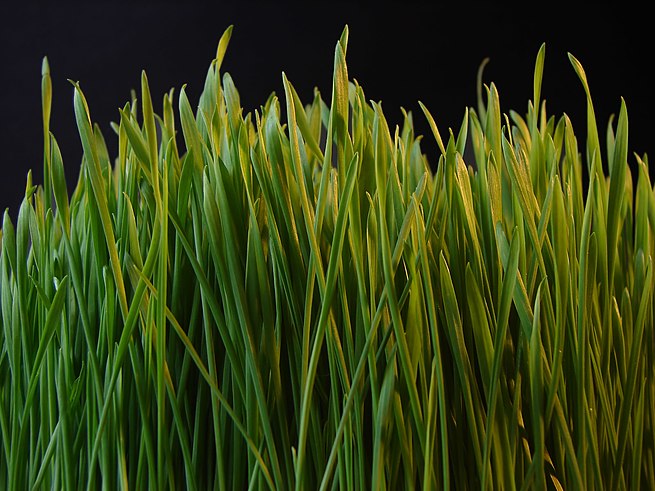Main Difference
The main difference between Grass and Weed is that the Grass is a family of plants and Weed is a plant.
-
Grass
Poaceae or Gramineae is a large and nearly ubiquitous family of monocotyledonous flowering plants known as grasses. Poaceae includes the cereal grasses, bamboos and the grasses of natural grassland and cultivated lawns and pasture. Grasses have stems that are hollow except at the nodes and narrow alternate leaves borne in two ranks. The lower part of each leaf encloses the stem, forming a leaf-sheath. With around 780 genera and around 12,000 species, Poaceae are the fifth-largest plant family, following the Asteraceae, Orchidaceae, Fabaceae and Rubiaceae.
Grasslands such as savannah and prairie where grasses are dominant are estimated to constitute 40.5% of the land area of the Earth, excluding Greenland and Antarctica. Grasses are also an important part of the vegetation in many other habitats, including wetlands, forests and tundra. The Poaceae are the most economically important plant family, providing staple foods from domesticated cereal crops such as maize, wheat, rice, barley, and millet as well as forage, building materials (bamboo, thatch, straw) and fuel (ethanol).
Though they are commonly called “grasses”, seagrasses, rushes, and sedges fall outside this family. The rushes and sedges are related to the Poaceae, being members of the order Poales, but the seagrasses are members of order Alismatales.
-
Weed
A weed is a plant considered undesirable in a particular situation, “a plant in the wrong place”. Examples commonly are plants unwanted in human-controlled settings, such as farm fields, gardens, lawns, and parks. Taxonomically, the term “weed” has no botanical significance, because a plant that is a weed in one context is not a weed when growing in a situation where it is in fact wanted, and where one species of plant is a valuable crop plant, another species in the same genus might be a serious weed, such as a wild bramble growing among cultivated loganberries. In the same way, volunteer crops (plants) are regarded as weeds in a subsequent crop. Many plants that people widely regard as weeds also are intentionally grown in gardens and other cultivated settings, in which case they are sometimes called beneficial weeds. The term weed also is applied to any plant that grows or reproduces aggressively, or is invasive outside its native habitat. More broadly “weed” occasionally is applied pejoratively to species outside the plant kingdom, species that can survive in diverse environments and reproduce quickly; in this sense it has even been applied to humans.Weed control is important in agriculture. Methods include hand cultivation with hoes, powered cultivation with cultivators, smothering with mulch, lethal wilting with high heat, burning, or chemical attack with herbicides.
-
Grass (noun)
Any leaves that arise from nodes in the stem and leaf bases that wrap around the stem, especially those grown as ground cover rather than for grain.
-
Grass (noun)
Various plants not in family Poaceae that resemble grasses.
-
Grass (noun)
A lawn.
-
Grass (noun)
Marijuana.
-
Grass (noun)
An informer, police informer; one who betrays a group (of criminals, etc) to the authorities.
-
Grass (noun)
Sharp, closely spaced discontinuities in the trace of a cathode-ray tube, produced by random interference.
-
Grass (noun)
Noise on an A-scope or similar type of radar display.
-
Grass (noun)
The season of fresh grass; spring.
-
Grass (noun)
That which is transitory.
-
Grass (verb)
To lay out on the grass; to knock down (an opponent etc.).
-
Grass (verb)
To act as a grass or informer, to betray; to report on (criminals etc) to the authorities.
-
Grass (verb)
To cover with grass or with turf.
-
Grass (verb)
To expose, as flax, on the grass for bleaching, etc.
-
Grass (verb)
To bring to the grass or ground; to land.
“to grass a fish”
-
Weed (noun)
Any plant regarded as unwanted at the place where, and at the time when it is growing.
“If it isn’t in a straight line or marked with a label, it’s a weed.”
-
Weed (noun)
Short for duckweed.
-
Weed (noun)
Underbrush; low shrubs.
-
Weed (noun)
A drug or the like made from the leaves of a plant.
-
Weed (noun)
Cannabis.
-
Weed (noun)
Tobacco.
-
Weed (noun)
A weak horse, which is therefore unfit to breed from.
-
Weed (noun)
A puny person; one who has little physical strength.
-
Weed (noun)
Something unprofitable or troublesome; anything useless.
-
Weed (noun)
A garment or piece of clothing.
-
Weed (noun)
Clothing collectively; clothes, dress.
-
Weed (noun)
An article of dress worn in token of grief; a mourning garment or badge.
-
Weed (noun)
(Female) mourning apparel.
“He wore a weed on his hat.”
-
Weed (noun)
A sudden illness or relapse, often attended with fever, which befalls those who are about to give birth, are giving birth, or have recently given birth or miscarried or aborted.
-
Weed (verb)
To remove unwanted vegetation from a cultivated area.
“I weeded my flower bed.”

